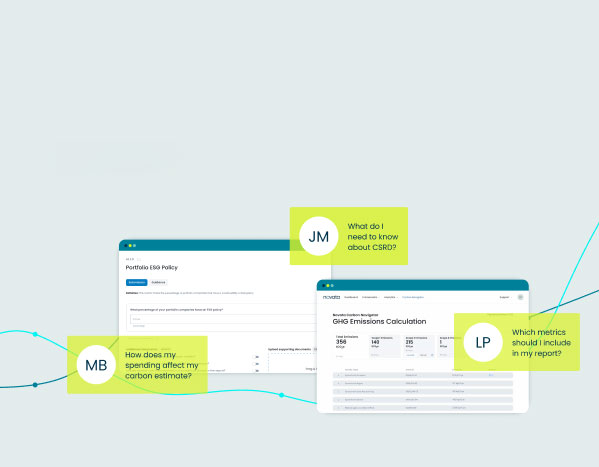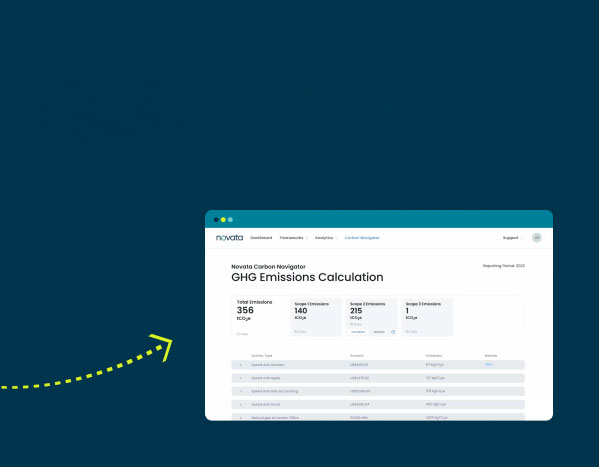In private markets, the ability to analyze ESG data is critical for investors to leverage the opportunities this data can provide. Benchmarking is an essential tool for unlocking these opportunities. But what is ESG benchmarking and how can investors use it to gain insights that lead to better performance and improved financial value?
ESG benchmarking involves measuring a company’s performance on set sustainability metrics relative to peers or industry standards. When evaluating an existing or potential portfolio company, setting baseline expectations for performance enables investors to compare metrics, practices, and outcomes across similar companies or portfolios.
Is ESG Benchmarking Important?
ESG data is difficult to understand in a vacuum. To truly make sense of what their data is telling them, companies need to be able to contextualize performance. Comparing against an established standard provides the necessary insight into how a company fares on set metrics or priorities. This insight makes it easier to set measurable targets for improvement, track a company’s ESG progress over time, and gain a more complete picture to inform decision-making.
Private Markets and ESG Benchmarks
Historically, transparency into ESG data has been a challenge in private markets. This lack of visibility into data has made it difficult for investors and private companies to compare performance across similar companies and better understand where they stand relative to peers. However, stakeholders’ demand for ESG data continues to rise, with limited partners (LPs) and regulators requesting sustainability-related disclosures from general partners (GPs) and private companies. Given the continued interest, the ability to contextualize performance is a competitive advantage.
What Data Goes Into ESG Benchmarking?
Accurate benchmarks require high-quality, comparable data. Before collecting ESG data, it is important to first identify the metrics that are material to a given company. For example, a Cybersecurity Policy may be material for a company in the technology sector. Providing guidance for portfolio companies on how to calculate and collect requested metrics can help ensure the quality of the data investors receive and make it easier to measure performance. At Novata, providing this guidance around data collection is integral to the development of Novata Benchmarks.
How Can ESG Benchmarking Benefit My Private Equity Firm?
For private equity firms, context is key for understanding ESG performance. The context that benchmarking can provide makes it easier for investors to understand where companies are under-performing, identify potential risk areas that impact financial value, and develop action plans to manage them. Similarly, the data can reveal areas where companies are leading the pack and key opportunities to improve performance. With a fuller picture of performance, investors can better prioritize opportunities and appropriately allocate resources to support portfolio companies.
What Are Examples of Successful Uses of ESG Benchmarks?
Consider an investor interested in how a potential investment company is accounting for the shift toward renewable energy. Carbon emissions continue to be a growing risk, and with regulation around disclosures increasing, the need to move to a greater proportion of renewable energy is a risk and opportunity with potential financial implications. When analyzing the percentage of renewable energy the company uses, the investor finds that it falls in the bottom quartile compared to companies with similar characteristics. With this in mind, the investor can accurately account for the expected costs to shift to renewable energy sources and advance decarbonization efforts.
Additionally, studies show that an ESG focus can impact a firm’s ability to fundraise — a recent KPMG survey of 200 M&A practitioners found that 59% of corporate investors have had deals canceled due to ESG due diligence findings. 63% of investors also noted their willingness to pay a premium for companies that align with their ESG priorities. With ESG benchmarking, investors are able to set realistic, data-driven goals and track progress on initiatives over time. This can help them demonstrate the value of their ESG program and attract socially responsible investors.
What Challenges Can ESG Benchmarking Help Solve?
- Data Transparency: Benchmarking can promote transparency and accountability in ESG reporting by enabling firms to communicate on their sustainability journey with data-backed targets and outcomes. Reporting with accurate, comparable data also mitigates the risk of greenwashing.
- Standardization: In a complex ESG landscape, having a standardized reporting framework is a challenge. Contributing to or using established benchmarks to measure performance can help facilitate the consistent comparison of ESG practices.
- Data Quality: The accuracy of benchmarks depends on the quality of the data collected. The ability to accurately measure performance through benchmarks is an incentive for companies to collect comprehensive ESG data that provides actionable insights.
Benchmark Your ESG Data with Novata
The ability to review ESG data in context and gain actionable insights to improve performance is essential for today’s investors. Novata Benchmarks are the private markets’ broadest collection of ESG benchmarks. Novata makes it easy for investors and portfolio companies to collect, analyze, benchmark, and report on the metrics that matter. Learn more about Novata’s ESG benchmarks.






